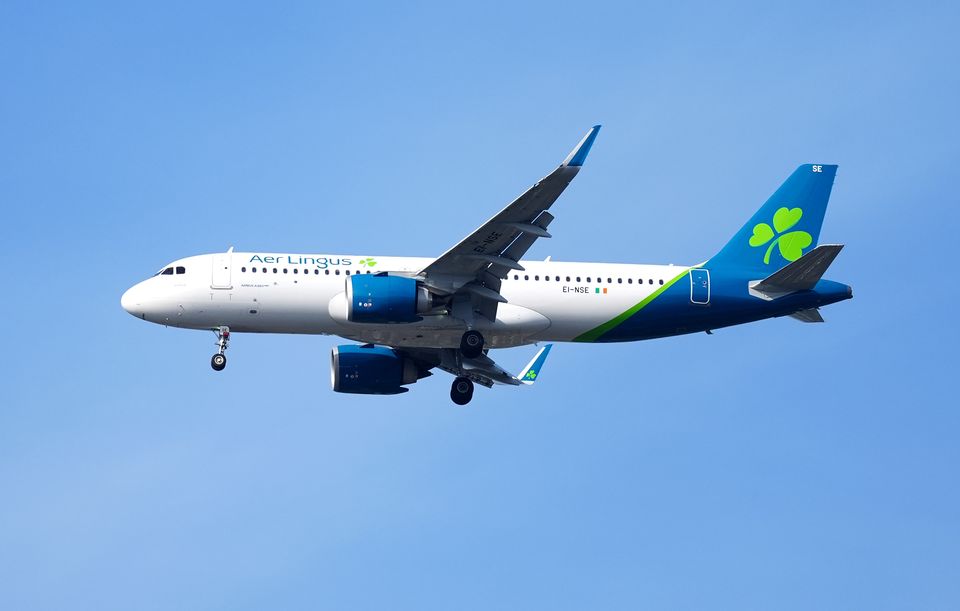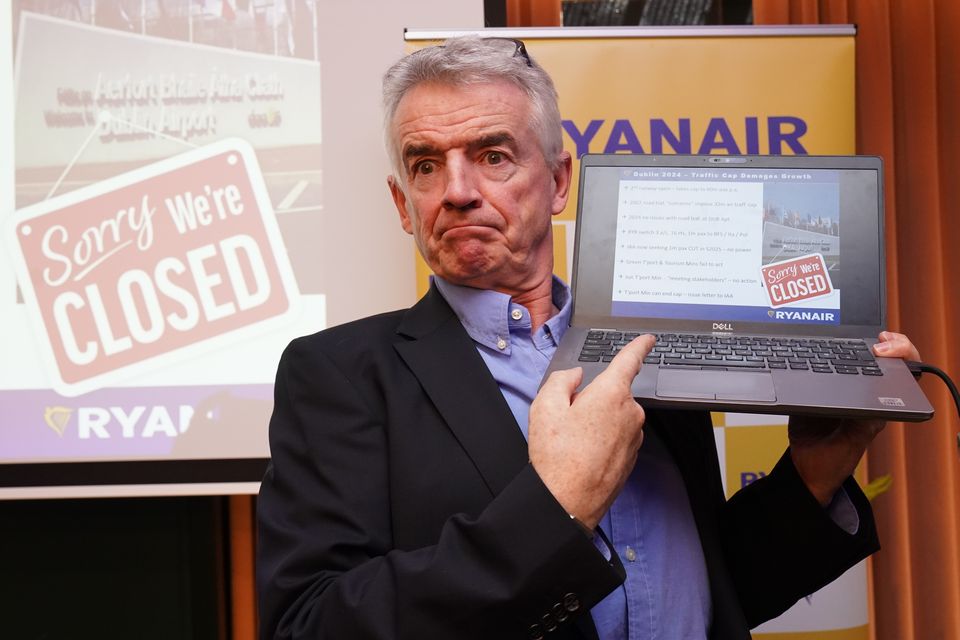The High Court has paused a decision that would affect the number of passenger seats available on aircraft at Dublin Airport during next year’s summer season.
The decision by the Irish Aviation Authority (IAA) to implement the passenger cap would affect airlines’ access to take-off and landing slots over the summer period.
A number of airlines, including Ryanair and Aer Lingus, along with an organisation representing a number of US airlines including Airlines For America, sought for the decision to be paused pending the outcome of judicial proceedings they are bringing in relation to the cap.
The seat cap, which is determined by the IAA, operates from March 30 to October 25 2025, and during that period it caps the number of passengers at Terminals 1 and 2 at Dublin Airport at 25.2 million.
A number of airlines, including Aer Lingus, sought for the decision to be paused pending the outcome of judicial proceedings they are bringing in relation to the cap (David Davies/PA)
This would equate to around one million fewer than were available in the summer this year.
The IAA put the limit in place to keep Dublin Airport within its annual 32 million passengers cap.
The Dublin Airport traffic limitation is based on planning regulations dating back to 2007.
The airlines outlined to the court the impact of the decision, and described in detail the “harm” they say will flow from the passenger capacity restrictions.
Aer Lingus claimed the passenger cap will have financial, operational and reputational impacts and also impact the economy and consumer prices.
It told the court that the estimated financial impact for the summer next year is 84 million euros, which it said will increase if the passenger cap goes ahead.
The airline estimates that the cap will lead to a reduction of at least 671,000 seats, or around 8.5% of the summer season, and a reduction of 362,000 seats compared with summer 2024 numbers.
It also claimed that as there can be no compensation for the withdrawal of historic seats, that “permanent irreparable harm” will be caused.
Ryanair said that if the decision is not stayed, it will have “significant financial, operational and reputational impacts”, and the airline said the decision will affect its access to historic slots and access to pool slots.
The reduction in access to pool slots affects Ryanair’s ability to operate ad hoc flights for sporting events outside the country, the court was also told.
As many of the aircraft are “anchored” to Dublin Airport, the airline said it will be significantly impacted because it will not be able to deploy those aircraft to other routes.
Ryanair estimated it will lose around 3,000 slots or more than 50,000 seats next summer, which it said equates to two weeks of its business over the season at the airport.
It said it could result in the region of a 50 million euro loss, and will have an effect on management time and disruption to engineering and fleet management functions.
In its long-term effect, the airline also said it could have a potential impact on “very substantial plans” to modernise and expand its Dublin-based fleet.
It also claimed that it would lead to increased costs for the travelling public.
In his decision, Justice Barry O’Donnell agreed that the passenger cap would result in “serious irreparable and permanent harm”.
He said he is satisfied that there is a “very strong argument” that the harm likely to be suffered will not be compensated by an award of damages, and that the harm envisaged involves “very significant financial loss” and an interference with statutory rights to historic slots.
“Those rights are asserted to be in the nature of protected property rights and, again for the purposes of this application, there is a very strong argument that those rights could not be restored if the applicants succeeded at trial,” Justice O’Donnell added.
“In that regard, the question arises as to whether the applicants will be left without an effective remedy to vindicate their EU law rights if the stay is not granted but they succeed at trial.”
Ryanair welcomed the High Court ruling.
Ryanair chief executive Michael O’Leary welcomed the decision by the High Court (Brian Lawless/PA)
Chief executive Michael O’Leary said: “It is deeply regrettable that the airlines had to take legal action to stay the idiotic cap at Dublin Airport solely because Transport Minister Eamon Ryan wouldn’t do his job and issue a letter to the IAA.
“The Dublin Airport cap is in breach of EU law and any competent Transport Minister (not to mention Tourism Minister, Catherine Martin) would have acted to scrap this outdated and damaging cap.
“Today’s High Court ruling clears the way for this matter to be referred to the European Courts where Ryanair is confident that this absurd road traffic restriction from 2007 will be removed, which will enable airlines like Ryanair to continue to grow traffic, tourism, and jobs in Ireland, where two Green ministers (Eamon Ryan and Catherine Martin) have failed to act for the last five years.
“We hope the forthcoming election will remove the deadhanded Green Party incompetence from Irish tourism and aviation so that Ryanair can return to growing at Dublin Airport instead of sending growth to Belfast, Italy and Poland.”
In a statement, the IAA said: “The remainder of the IAA’s summer 2025 slot parameter decision stands and the coordination to that capacity will happen in the coming days in the normal way.
“The IAA notes that the alleged harm identified by the airlines flows from the planning conditions rather than from the IAA taking account of those conditions.
“The Winter 2024 scheduling season commenced on Sunday October 27 and runs until the end of March 2025. A seat cap of 14.4m remains in place for this period. No party sought a stay on that decision.
“The hearing for the underlying judicial reviews is due to commence on December 3.”

